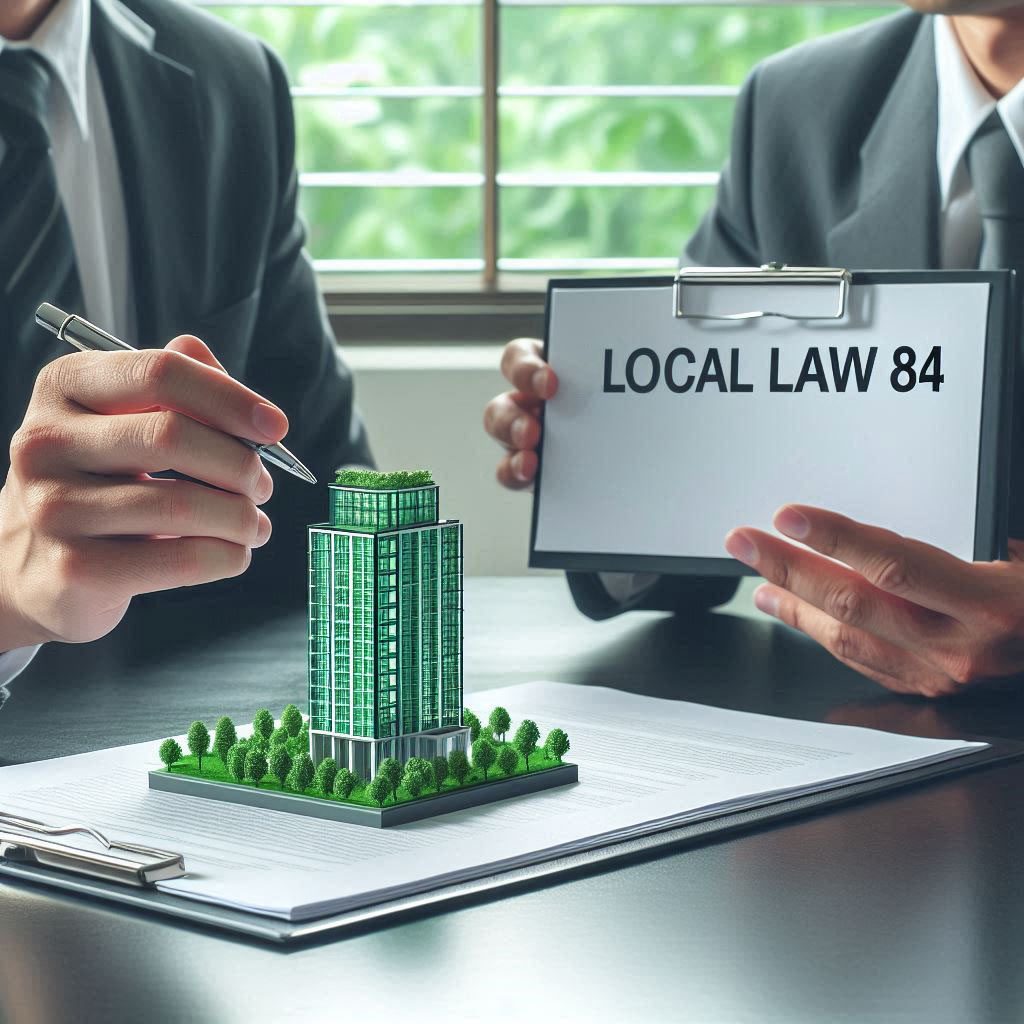Navigating the complexities of property ownership in New York City can often feel like a Herculean task, especially when it comes to understanding the implications of various building laws. Amongst these, Local Law 84 stands out as a crucial piece of legislation that property owners must be aware of due to its significant impact on property taxes.
I. Introduction
A. Brief Introduction to Local Law 84
Local Law 84, part of the Greener, Greater Buildings Plan enacted in 2009, requires property owners of buildings larger than 50,000 square feet to submit annual energy and water consumption reports. This benchmarking initiative is a stepping stone towards making New York City’s buildings more energy-efficient and is a critical effort in fighting climate change.
B. Explanation of How It Affects Property Taxes
At first glance, Local Law 84 might seem like just another regulatory hoop to jump through. However, it carries with it a ripple effect that can significantly influence your property’s financial liabilities in the form of taxes. Non-compliance is met with immediate penalties, but the nuances of the law have deeper implications on your tax bill.
C. Significance of Understanding This Law for Property Owners
This isn’t just about adhering to a law; it’s about recognizing an opportunity to transform your property into a sustainable and economically attractive asset. As a property owner, your grasp on Local Law 84 can position you to leverage potential tax benefits while contributing positively to the city’s environmental goals.
II. Understanding Local Law 84
A. Detailed Description of Local Law 84
Local Law 84 was conceived as a legislative response to the increasing concerns over climate change and the need for sustainable development. By mandating large buildings to track and report their energy and water use, the city aims to encourage the reduction of carbon emissions, a significant contributor to urban environmental problems.
What It Entails for Property Owners
Beginning in 2010, Local Law 84 required annual energy and water benchmarking reports for buildings over a certain size threshold. This report feeds into the Energy Star Portfolio Manager, a tool designed by the EPA to assess the energy performance of buildings nationwide. Failure to submit these reports results in fines, which increase with continued non-compliance.
B. How Local Law 84 Affects Property Taxes
Direct Impacts
The direct financial implications come in the form of penalties. As per the New York City Department of Buildings, these can accumulate over time, directly inflating the cost of property ownership.
Indirect Impacts
On the other hand, market perceptions of energy-efficient buildings could elevate property values, thereby increasing tax liabilities. Conversely, buildings that perform poorly in benchmarking may be seen as less desirable, potentially decreasing their value.
III. The Relationship between Local Law 84 and Property Taxes
A. Understanding Property Taxes
How They Are Calculated
In New York City, property taxes are calculated by multiplying the assessed value of the property by the prevailing tax rate. The Department of Finance assesses property values, considering factors such as location, building size, construction type, and building usage.
Different Factors That Affect Property Taxation
Value assessments are influenced by comparable sales, income and expense data for rental properties, and any construction or improvements made to the building. Each of these factors can sway the assessment, thereby impacting the tax.
B. The Role of Local Law 84 in Property Taxation
How Building Energy Efficiency Can Affect Tax Amounts
Properties that demonstrate high energy efficiency through their benchmarking reports may enjoy a higher market valuation due to the growing demand for sustainable living spaces. As a result, they could be subject to higher taxes consequent to their increased value.
The Potential of Local Law 84 to Increase/Decrease Your Property Taxes
Energy efficiency isn’t just about reducing utility bills; it’s an investment that can potentially offer a return through increased property valuation and corresponding tax implications.
IV. What You Can Do About It
A. Actions to Minimize Negative Impacts of Local Law 84 on Your Property Taxes
- Energy Compliance: Strengthening the energy efficiency of your property ensures not only compliance but opens up the potential for various tax incentive programs tailored for energy-conserving buildings.
- Energy Conservation Measures: By implementing energy-saving upgrades, the operational costs of your property can decrease. These conservation measures could range from installing LED lighting to upgrading HVAC systems.
- Tax Mitigation Strategies: Tax credits, rebates, and incentive programs for green buildings can significantly offset the initial cost of energy upgrades and reduce your overall taxation burden.
B. Potential Benefits to Consider
Over time, energy-efficient properties tend to have lower operational costs, contributing to a better bottom line. They also tend to retain their value better and appeal more to eco-conscious renters or buyers.
C. Expert Advice and Resources for More Help
To navigate the complexities of Local Law 84 and its impact on your taxes, it’s wise to consult with experts in real estate law, tax professionals, and energy consultants who can provide tailored advice and guidance.
VI. Conclusion
We’ve traversed the essentials of Local Law 84, its origins, requirements, and how it intertwines with property tax calculations. We’ve also highlighted actionable strategies to mitigate any negative tax implications, including embracing energy compliance and conservation measures. The key takeaway for property owners is the importance of being proactive. By understanding Local Law 84, you can turn potential financial challenges into opportunities for both cost savings and contributing to a more sustainable city.
Furthermore, the conversation about Local Law 84 is ongoing. Engaging with a community of property owners, sharing insights, and keeping abreast of new developments and incentives are vital steps in managing your property’s fiscal and environmental responsibilities. It’s through this knowledge-sharing that you can discover innovative ways to ensure that Local Law 84 works in your favor, both ecologically and economically.
VertPro.com serves as a resourceful platform for property owners and managers seeking to enhance their buildings’ energy efficiency. The site offers a range of services, including Commercial Energy Audits, Benchmark Compliance consultancy, and a Construction Marketplace. At the heart of VertPro® is a suite of SaaS technology-based solutions designed to assist in navigating the complexities of Energy Benchmarking and Energy Audits/RCx Plus, while ensuring adherence to over 60 Energy Benchmarking and Energy Efficiency Laws across the country.
For those looking to improve their property’s energy usage and operational value, VertPro.com provides a diverse array of tools and information. The site aims to facilitate a better understanding of energy efficiency practices and legislation, helping building owners and property managers make informed decisions about their energy strategies while complying with all energy ordinances and laws.



